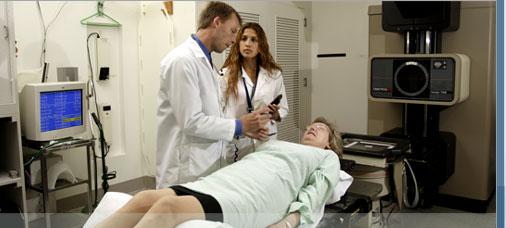
July 29, 2009 - A new proposal from the Centers for Medicare and Medicaid Services (CMS) to cut payments for radiation therapy treatments would cause many cancer centers to close, stop accepting Medicare patients, lay off support staff and reduce services to cancer patients, according to a survey conducted by ASTRO, the American Society for Radiation Oncology.
New technology has allowed radiation oncologists to improve cancer cure rates while reducing side effects. However, on July 13, CMS announced proposed changes to the Medicare policies and payment rates for physician services, including radiation oncology, that would cut payments to radiation therapy services by nearly 20 percent. Community cancer centers, particularly those in rural and suburban areas, would be hardest hit. Running 2008 claims data from a sample of practices across the country showed overall impacts between 18 and 31 percent on the average practice, with some services receiving payment cuts by up to 44 percent. If approved, these cuts would take effect on January 1, 2010.
"Take, for example, Joyce Wittet from Ontario, Ore., population 11,245. The 79-year-old retired teacher had breast cancer that was easily cured with radiation therapy. Fortunately, there is a cancer center 15 minutes away that accepts Medicare. If the cuts had caused her cancer center to close, she would have had to drive to a hospital nearly two hours away, roundtrip for six straight weeks. If faced with this option, Joyce might have had to choose between mastectomy or expensive travel costs to cure her cancer. Worse still, she might have even forgone treatment altogether until it was too late," said Patricia Eifel, M.D., FASTRO, chairman of ASTRO and a radiation oncologist at M.D. Anderson Cancer Center in Houston. "We applaud Congress and the Obama Administration for their efforts to improve access to healthcare for more Americans. However, this CMS proposal would do just the opposite: limit access through longer waits to begin treatment, less time with doctors and longer, costlier drives to receive treatment."
Five-hundred-fifteen individuals responded to ASTRO's survey. For community-based practices, in the face of 30 percent cuts, two out of five say they would close their practice. Forty-seven percent of rural practices say they would close. Sixty percent of community practices with multiple locations will consolidate their practices. Among those community practices able to stay open, 54 percent say they will no longer accept Medicare patients and 68 percent say they will limit the number of Medicare patients they treat.
If the cuts force radiation oncologists to consolidate or close their practices, 43 percent said their cancer patients would be forced to travel more than 50 miles round-trip, for radiation therapy treatments. In rural areas, 81 percent reported that patients would have to travel more than 50 miles. Overall, 97 percent of community practices said the quality of care for cancer patients receiving radiation therapy would suffer due to the cuts.
"My center is not viable at greater than 20 percent cuts, and patients already drive an hour to us. They then would drive nearly two hours one-way to the next center. We are the primary service center for six rural counties and we are barely holding on as it is now in the recession. About four of 10 patients now have no insurance, and we treat them. With these Medicare cuts, we will be forced to close," said a survey respondent from rural North Carolina. Congressional leaders urge CMS to reconsider.
ASTRO is running a series of ads on WTOP, Politico, Congressional Quarterly Today, Roll Call and in an AARP publication to raise public awareness of the proposed cuts and to encourage citizens to ask members of Congress to sign on to the bipartisan letter written by Reps. Lois Capps (Calif.), Parker Griffith, M.D. (Ala.), Sue Myrick (N.C.), and Mike Rogers (Mich.) urging CMS to reconsider. ASTRO praises the leadership of these representatives and more than 25 of their colleagues who've already committed to sign the letter.
"Radiation oncology is critical for the effective treatment of our nation's cancer patients. While we need to work together to cut healthcare costs, lumping in radiation therapy with diagnostic imaging doesn't serve our patients. We need to make sure that all cancer patients, including those who live in rural areas and depend on Medicare, have access to all the tools and resources they need to make a full recovery," said Rep. Capps.
"As a radiation oncologist who practiced in the community setting, I am aware of how these severe cuts would limit access to life-saving radiation therapy for cancer patients. I am proud to be working on healthcare reform to expand access to high quality, effective care for cancer patients and all Americans, and I look forward to working with both parties as well as the administration to find a solution that averts these cuts and protects patient access to care," said Rep. Griffith.
"Radiation therapy helped me survive breast cancer, as it has millions of other women. I believe CMS made a mistake by roping radiation therapy in with these diagnostic imaging changes. This doesn't make sense if we're trying to improve access to care. I'm honored to join my colleagues in protecting patient access to radiation therapy by asking Medicare to prevent these cuts," Rep. Myrick said.
"Radiation oncology helps many people survive and even thrive after cancer diagnoses. There is no possible explanation for forcing cancer centers to close, stop seeing Medicare patients, lay off staff or use outdated equipment; doing so will certainly not help cancer patients. As a cancer survivor myself, I know how important it is to have access to every possible opportunity to fight for healing. Medicare patients should have the same opportunities to win their battle against cancer," Rep. Rogers said.
For more information: www.astro.org


 August 09, 2024
August 09, 2024 








